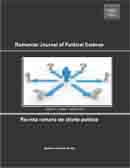Lessons from a Divided Society: How to Deal with Party Factionalism
Lessons from a Divided Society: How to Deal with Party Factionalism
Author(s): Alexandra IancuSubject(s): Politics / Political Sciences
Published by: Societatea Academică Română (SAR)
Keywords: party democracy; factionalism; ethnic party; political elites; UDMR
Summary/Abstract: Despite the fact that party dissolutions and degenerative forms of factionalism, no major splits or internal divides shaded the image of the main ethnic based party: the Democratic Alliance of Hungarians in Romania (DAHR). Similarly to other post communist countries, the minority representation in Romania constitutes an electoral success story. In a general framework of fragmentation and organisational instability, the DAHR’s political performance and continuity were doubled by an exceptional organisational strength. Although the ethnic based parties do tend to manifest higher levels of external cohesion as a result of their single-issue nature, their organisational continuity constitutes rather a cas a part which deserves further investigation. Consequently, the following article focuses on highlighting the mechanisms conducive to the accommodation of different factions considering that the anatomy of such internal arrangements constitutes an important resource for the understanding of party organisational survival. The analysis will show that even if DAHR seems to describe a mixture of party types, with important elements of party centralisation and party discontent among elites and delegates, the internal party regulations, notably the party primary system, balanced the power struggles within the organisation, resulting thus in a general model of auto proclaimed party democracy.
Journal: Romanian Journal of Political Sciences
- Issue Year: 12/2012
- Issue No: 01
- Page Range: 4-34
- Page Count: 31
- Language: English
- Content File-PDF

